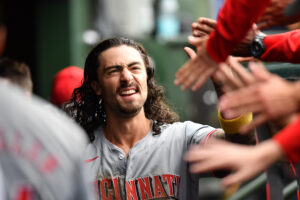The Atlanta Braves kickstarted their 2018 season with a thrilling comeback, defeating the Philadelphia Phillies 8-5 at SunTrust Park. The Atlanta offense delivered a power surge, scoring six of their eight runs via the long ball. The Phillies took an early 5-0 advantage headingninto the bottom of the sixth inning. There, a questionable managerial decision by Phillies manager Gabe Kapler ultimately decided the fate of his team.
Atlanta Power Surge Drives Braves’ Comeback
The Atlanta Braves offense is loaded with talent. However, there’s always been a question about power. Apart from Freddie Freeman, there is no consistent power in the lineup. To start the season, Braves manager Brian Snitker made the decision to place Nick Markakis in the clean-up spot.
Let’s start by saying Markakis is in no way a power threat. In fact, he’s probably the least powerful clean-up hitter in baseball. But he gives Freddie Freeman the best protection in the lineup. Any option you could choose to replace Markakis would throttle him in the power department, but Markakis is the proven veteran for this specifically unique lineup to bat behind Freeman.
Freeman was on-base four of his five at-bats. One of those at-bats was a home run. On two others, Markakis faltered, with a pop-out in the first and a strikeout in the eighth. The fourth? Markakis cranked a three-run home run to right-center to walk it off in Atlanta.
The rest of the power surge shouldn’t come to a surprise to Braves fans. Freddie Freeman unleashed his first of many home runs this season in the sixth inning. Then there’s Ozzie Albies.
The Atlanta second baseman should not surprise anyone as a power threat anymore. After six home runs in 57 games during his 2017 pro debut, three home runs in 22 games during Spring Training and the eighth inning bomb to push the Braves comeback into reality, Albies is the real deal in a small package. This is a dangerous lineup in Atlanta, with the capabilities of being tops in the National League.
The Importance of Carrying Three Catchers
The Atlanta Braves decided to carry three catchers to start the season, adding veteran Chris Stewart to the platoon of Tyler Flowers and Kurt Suzuki. It seemed odd for Atlanta to carry another catcher when they already have a platoon that was the best at its position last season. We realized the necessity of that decision on Opening Day.
Flowers felt some left oblique discomfort during his swing during the fourth pitch of his first at-bat and was immediately pulled from the game, with Suzuki substituting. The injury for Flowers is day-to-day and he shouldn’t miss any significant time. Where the third catcher option was decisive came in the eighth inning. With Kurt Suzuki on third with the Braves down 5-4, Atlanta manager Brian Snitker decided to pinch-run Peter Bourjos for Suzuki, only needing a sacrifice fly to tie the game.
Now, Suzuki would have scored regardless on Preston Tucker’s single to center. But the option to pinch-run for Suzuki would never have occurred had Chris Stewart not appeared on the roster Opening Day. You never know what can happen in a Major League season, but Atlanta was prepared today and it helped them win at least one baseball game.
Julio Teheran Wasn’t Special, But Effective
Atlanta Braves starter Julio Teheran had a effective Opening Day start for Atlanta. The majority of Teheran’s dreadful 2017 campaign resulted in a poor fastball/change-up combination. He was able to locate his fastball and change-up for the most part, but the real improvement came in the sinker becoming more prominent in his repertoire.
The problems for Teheran arose the same way they did last season. First, he walked pitcher Aaron Nola on five pitches to start the third inning. Then, he walked catcher Andrew Knapp ahead of Nola in the fifth inning. Now, Teheran did battle back to induce double plays after both walks. With that said, Teheran has to lower his walk rate—especially at the bottom of the order—to be successful in this ballpark.
Gabe Kapler Cost Phillies the Game in Sixth Inning
The Philadelphia Phillies offense exploded for four runs in the top of the sixth inning. They had knocked Julio Teheran out of the game and had a comfortable 5-0 lead with twelve outs remaining. Starter Aaron Nola was cruising through five innings. Then, Ender Inciarte lead the sixth inning off with a double, followed by a deep fly-out by Ozzie Albies. Eleven outs remaining.
This is where Gabe Kapler made the decision that cost his team a win in Atlanta.
Kapler removed Nola, ending his 68-pitch, three-hit shutout performance. Now, Nola has never pitched more than 170 innings in a season. Plus, he gave up two hard hit balls the two previous at-bats, with slugger Freddie Freeman coming to the plate. Kapler also brought in Hoby Milner to relieve Nova. Freeman was 0-5 against Milner lifetime. Great management decision, right?
Well, Freeman scorched his first home run of the season, cutting the Philadelphia lead 5-2. Kapler would use four more relievers after Milner. Here’s their line: five hits, three walks and five runs—including two home runs— in three innings pitched.
This was a horrendous decision from Kapler and it cost his team the game. You do not remove a player pitching that effectively after 5.1 innings. It doesn’t matter the lead. It doesn’t matter the situation. You have to let one of your young ace pitchers—not to mention recent Braves killer—prove himself. Kapler pulled the string and everything unraveled beneath him.
Main Photo:
Embed from Getty Images






